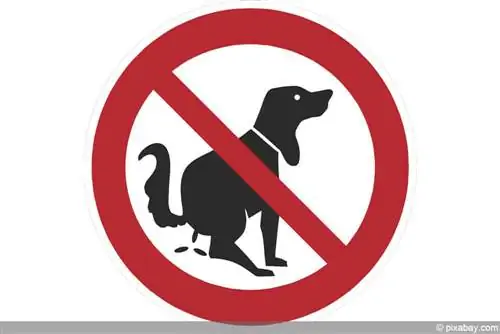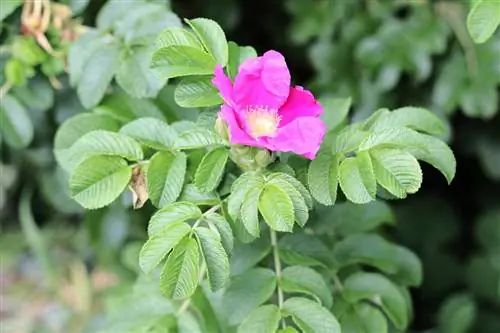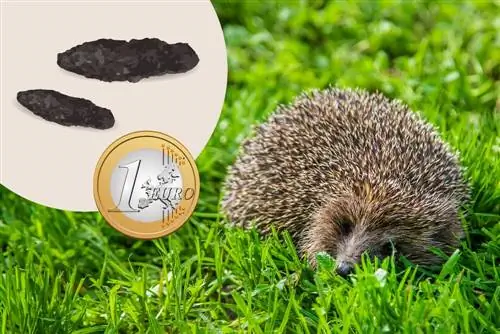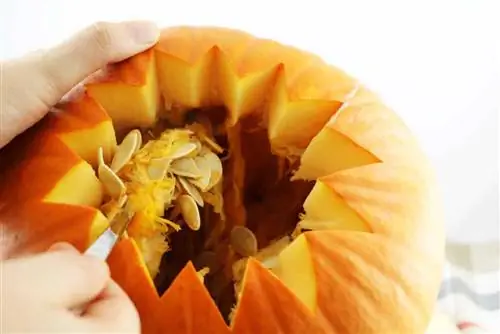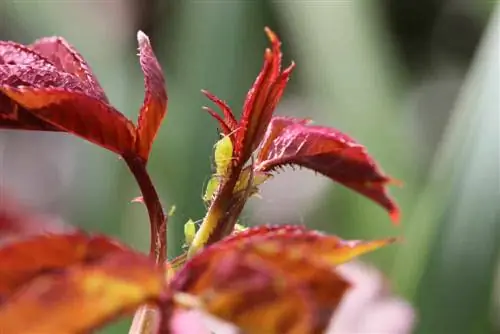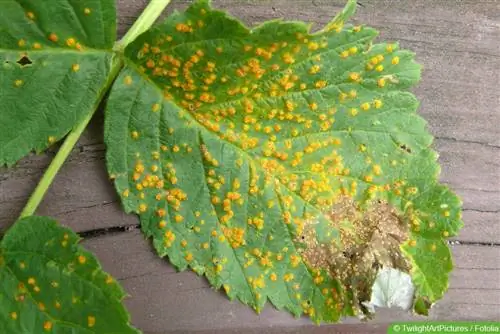- Author admin caroline@plants-knowledge.com.
- Public 2023-12-17 03:39.
- Last modified 2025-06-01 06:48.
No one really finds dog poop in the garden particularly irritating, be it from their own dog or a stray dog. It is completely normal for these animals to mark their territory and leave one or two piles behind. This is particularly unpleasant in the garden. But with a few tips and measures you can take countermeasures and keep your four-legged friends away from the garden or certain areas of the garden.
Measures to avoid dog feces
To stop man's best friend from repeatedly placing annoying dog poop in the garden, the strategy should be to make the garden as unattractive as possible for the animal. Their sensitive sense of smell plays an important, if not the decisive, role. In addition, it can be very helpful if the dog has received some training from its owner. However, it is not always your own dog, but often the neighbor's dog or a stray animal that uses the garden as a dog toilet.
As an immediate measure, you can cover beds with nets, gratings or pebbles, for example. Dogs are very reluctant to walk on such surfaces. However, these measures only provide short-term protection, so you have to look for more effective methods. No matter which method you choose, it should definitely be animal-friendly and as environmentally friendly as possible. Animals should not be harmed under any circumstances.
Build a barrier
In order to keep strange dogs out of the garden, it is advisable to erect barriers that are sufficiently high and as insurmountable as possible. These are particularly effective in combination with agents that can be used for defense, such as herbs, plants, spices or other substances with intense scents. Appropriate barriers can be created at different heights, with not only the height but also intense scents or other special plant properties having a deterrent effect.
Fence as a barrier
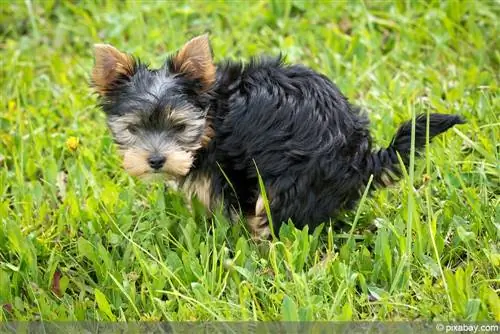
It is often due to missing or defective fencing when strange dogs contaminate your own garden with their feces. A fence is often the most effective protection against such intruders, although not the most cost-effective. For smaller dogs, a fence height of approx. 50 cm is usually sufficient. For larger dogs it should be significantly higher, around 150 cm. The respective fence material only plays a minor role. This can be a close-meshed chain link fence as well as a wooden or metal fence. For optimal protection, you should also make sure that possible gates and gates in the fence are always closed.
Tip:
If the fence is standing, you should check it regularly for holes or other damage and repair these as quickly as possible.
Creating a hedge
If you don't want to build a conventional fence, you can achieve a similarly good effect with a plant hedge. You should pay attention to a good selection of plants. Species that form a dense undergrowth are particularly effective. However, it usually takes several years for a hedge to achieve sufficient density, depending on the growth characteristics of the respective plant species and its size when purchased.
- Shrubs such as periwinkle, laurel or blueberries are very suitable
- Ideally in combination with verbena, peonies, Russian sage or lavender
- Smell of lavender is particularly unpleasant for dogs
- Avoid trees with thorns or spines, such as barberry or holly
- You could hurt dogs
- Piss off plant (Coleus canina) is particularly deterrent
- Unpleasant smell comes from essential oils in the fleshy leaves
- Can be noticed by dogs within a radius of up to two meters
- Fuck off plant is not hardy
- That's why cut cuttings in autumn for next season
- Then cut the cuttings over the winter in moist sand, frost-free
Tip:
So that the piss-off plant can develop its full effect, it is advisable to always plant several specimens at a maximum distance of 100 cm.
Mulch or gravel against dog poop
Another way to create a barrier against uninvited guests is to spread gravel or mulch. Both are materials that dogs don't like to walk on. Gravel can, for example, be spread as a boundary or over beds. As far as mulch is concerned, it is best to use pine needles or pine cones, which many dogs find particularly unpleasant.
Sprinkler systems with motion detectors
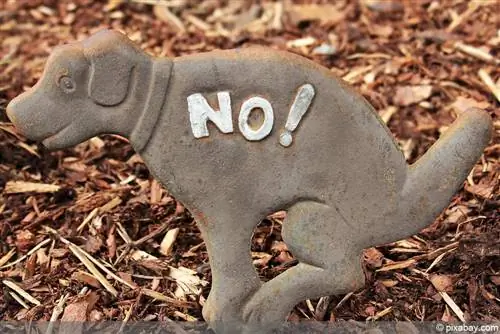
Of course you can also use technical aids to create a barrier. These can be, for example, sprinkler systems, preferably with motion detectors. If the dog approaches the water sprinkler, a sensor triggers a strong jet of water, which at best drives the stray away. If dogs have been exposed to it several times, they usually avoid the area in question because they associate it with splashes of water and which dog likes to be splashed wet.
Home remedies for annoying dog poop
In addition to fences, hedges and sprinkler systems, simple home remedies can also help prevent annoying dog poop in the garden. These are predominantly odor-intensive products. While some are very effective and yet safe for four-legged friends, products that are toxic to dogs are often recommended. These must be avoided at all costs. In addition, one or the other smell can be an odor nuisance for neighbors and should therefore only be used sporadically or in consultation with the person concerned.
Vinegar
- Sensitive dog noses react strongly to pungent smells
- Vinegar, which is said to be good for defense
- Use, for example with cotton balls soaked in vinegar
- Distribute balls where the dog has previously defecated or urinated
- Vinegar neutralizes most of dog urine
- This can stop the dog's territorial behavior
- To protect lawns, apply undiluted vinegar around the lawn
- An invisible barrier is created
- The smell of vinegar disappears relatively quickly
- Therefore repeat the whole thing daily and consistently
Baking powder and coffee grounds
Baking soda is said to be an effective way to prevent dog poop in the garden, as this old home remedy is also said to neutralize the smell of the dog's urine and ensure that it avoids these areas. To use the baking soda, mix about 180 g of it with 4 liters of water and then distribute this mixture in places where the dog has relieved itself.
Or you can apply it to a specific area, e.g. a bed or lawn. Another product that smells very unpleasant for dogs' noses is coffee grounds. Distributed in the appropriate places, it can also prevent your own dog or strangers from using the garden as a toilet.
Home remedies that you should avoid
In addition to the home remedies mentioned, there are also those that should not be used for dog deterrent purposes because they are harmful or sometimes even poisonous to dogs. These include cayenne pepper, lemon, mothballs, tobacco, ammonia and any cleaning products. Not every dog is sensitive to lemon, but dogs are said to have had he alth problems in the past.
Cayenne pepper, on the other hand, should be viewed more critically, as it can severely irritate the dog's paws, sensitive nose, face and skin. It is sometimes recommended to crush mothballs and then distribute the powder on the areas to be protected. This is definitely not recommended as the ingredients in these balls are toxic to dogs.
Make sure you use the right fertilizers
Sometimes a certain fertilizer can also attract dogs, because as already mentioned, dogs react strongly to smells. While some scare them away, there are also those who attract dogs. These primarily include organic fertilizers; they can contain corresponding fragrances. An organic fertilizer that dogs don't like the smell of is horse manure. In most cases, the animals avoid areas where it was spread.
Tip:
Since horse manure can also be unpleasant for the human nose, you may also have the option of purchasing it commercially, which usually has a less intense odor.
Commercial dog repellents
If you don't want to rely exclusively on barriers or home remedies, you can use special repellents from specialist retailers. They are offered as sprays, powders or in the form of so-called ultrasonic repellents and are available at pet stores or garden centers. Sprays and powders use dogs' sense of smell to drive them away or keep them away from certain areas. The smells emitted are based on those of wild animals or predators, which generally has a deterrent effect on dogs. The majority of these products contain natural ingredients, so they can be used without any problems.
The way commercially available ultrasonic repellent devices work is based on sound and ultrasonic waves that are triggered by a motion detector or sensor as soon as a dog or other animal approaches the device. These waves, which are imperceptible to humans, are very unpleasant for the animal, so it avoids this area depending on the range of the device in question. Ranges and prices for such devices vary depending on the manufacturer and features.
Thoroughly clean defecated areas
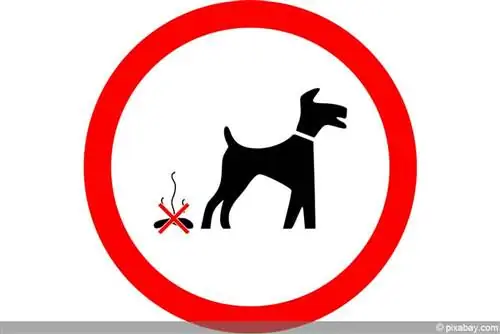
Similar to cats, dogs usually return to the places where they have already defecated or peed. This can leave real burn marks on both the lawn and plants if the whole thing is not removed promptly.
- Always remove existing piles in the garden quickly
- Clean the affected area thoroughly afterwards
- First spray the area with water
- This neutralizes the acid from the dog's waste
- Then, if necessary, spread some compost on cleaned surfaces
- Microorganisms in compost can restore balance to the soil
- Can protect against further defecation and unsightly stains in the lawn
Tip:
For safety reasons, you should always wear plastic gloves when removing dog feces and then clean your hands thoroughly. The reason for this is the germs, worms and viruses that may be contained in dog feces.
Preventing dog poop in the garden
If your dog is the only one who regularly uses the garden as a toilet, it should actually be relatively easy to break the habit. The magic word is 'education'. Dogs are very capable of learning, so they can be easily trained to behave appropriately.
The intelligent animals generally want to please their people and respond very well to the right training. It's not just the dog that's in demand, but above all the people, because it can take some time before the first successes become apparent. You often have to expect setbacks, which certainly justify the ultimate success.
Poison bait - a no-go
You always hear about people who have a fundamental problem with dogs and therefore put out poison bait. Poisoning an animal, regardless of its species, is extremely reprehensible and rightly a criminal offense. Here, too, the main demand is for those dog owners who do not have their animals under control and let them roam around without a leash, which means that dog feces often become contaminated, including in gardens.

